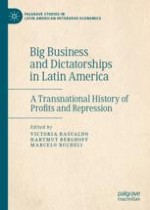2021 | OriginalPaper | Chapter
7. Banking Southern Cone Dictatorships
Author : Juan Pablo Bohoslavsky
Published in: Big Business and Dictatorships in Latin America
Publisher: Springer International Publishing
Activate our intelligent search to find suitable subject content or patents.
Select sections of text to find matching patents with Artificial Intelligence. powered by
Select sections of text to find additional relevant content using AI-assisted search. powered by
